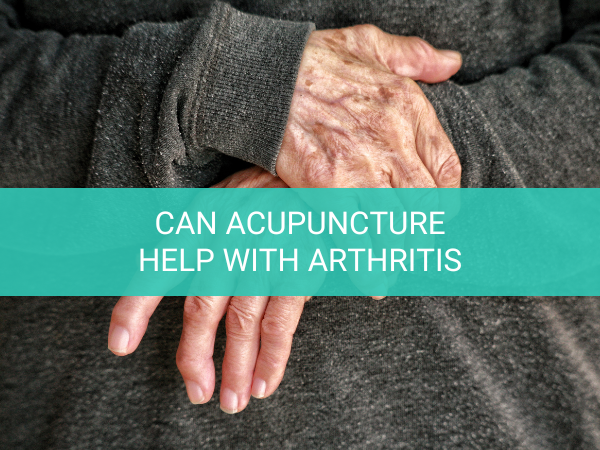Medical research and patient case studies show that acupuncture can help with arthritis pain. Though research into acupuncture treatment and its effects on arthritis is still developing, researchers believe the practice may help by doing the following:
- Blocking or confusing pain signals
- Reducing inflammation
- Improving circulation
- Reducing stress and anxiety associated with pain
Acupuncture treatments are linked to a variety of physiological benefits that improve whole-body health. As such, the practice is not only an effective pain management option – it’s also useful for reducing the side effects of pain medication.
Four Ways Acupuncture Helps with Arthritis Pain
Acupuncture’s efficacy in arthritis extends to osteoarthritis, rheumatoid arthritis (RA) and fibromyalgia conditions. In people with one of these chronic pain conditions, acupuncture can improve symptoms by:
- Blocking or confusing pain signals – When acupuncture needles are inserted into the skin, they provoke a series of physiological responses from the body. One of the best-understood is the release of endogenous opioid compounds, including endorphins. These natural painkillers are produced by the body, working to either block, confuse or otherwise sidetrack pain signals, reducing their intensity. Numerous studies have identified this link between acupuncture and endorphin release.
- Reducing inflammation – In addition to endorphins and natural painkillers, acupuncture needles trigger a cascade of anti-inflammatory effects. These effects are modulated through several pathways, including the hypothalamus-pituitary-adrenal (HPA) axis, which controls cortisol expression – an anti-inflammatory compound in the body.
Other anti-inflammatory effects include regulating certain immune cells, such as macrophages, stimulating the parasympathetic nervous system (which releases anti-inflammatory neurotransmitters) and modulating some allergic responses (which controls cytokine and histamine expression).
By minimizing inflammation, acupuncture treatments can reduce the severity of some arthritis symptoms, including joint pain and stiffness.
- Improving circulation – Acupuncture also increases the availability of nitric oxide in the blood, a compound responsible for regulating local circulation in tissues. When present around blood vessels, nitric oxide acts as a vasodilator, causing those vessels to relax and permit increased blood flow.
Enhanced circulation feeds tissues with additional nutrition and reduces inflammation further, contributing to relief from arthritic pain. Acupuncture needles stimulate this improved circulation by releasing beneficial vasodilators into the blood.
- Reducing stress and anxiety – Chronic arthritis pain can feed into anxiety, which itself can intensify chronic pain. It’s a frustrating cycle that acupuncture sessions may help correct. During treatment, acupuncture modulates nervous system activity, specifically the balance between the sympathetic and parasympathetic nervous system. When stimulated, the parasympathetic nervous system puts the body into a relaxed state, reducing heart and respiratory rates.
This can help arthritis patients manage the mental side of their condition, which can in turn help patients manage their pain.
What the Medical Research Says About Acupuncture and Arthritis Pain
Acupuncture’s pain-relieving effects have been thoroughly studied in hundreds of medical conditions. Chronic pain – including arthritis – has been a popular subject for research teams, and several studies demonstrate promise in patients. Those studies include:
- A 2018 review published in Evidence-Based Complementary Alternative Medicine. This analysis considered 43 research studies and focused on the link between acupuncture treatment and rheumatoid arthritis. Hundreds of RA patients and animal subjects were part of the analysis, and though additional high-quality research is needed, the research team concluded that acupuncture sessions could improve the outcomes of RA patients through several potential mechanisms. In addition to endorphin release, immune system regulation, anti-inflammatory effects and potential antioxidant effects were all suggested as reasons for efficacy in RA patients.
- A 2019 study focused on patients with RA of the hand and published in The Journal of Alternative and Complementary Medicine. This study focused on 105 RA patients. This patient group was split into three smaller groups – an experimental group that received verum (or true) acupuncture at noted acupuncture points, a second control group that received “sham” acupuncture, and a third group that received neither.
At a four-week follow-up after the study’s conclusion, experimental group (the verum acupuncture group) reported reduced pain, better grip strength, and better overall quality of life, compared to the sham acupuncture and no acupuncture groups.
An important note – this was a double-blinded study, making it a high quality piece of research for arthritis pain relief.
- A 2012 meta-analysis published in JAMA Internal Medicine. This analysis considered 29 studies and 17,922 patients. The studies were of varying quality, but the research team noted that acupuncture was more effective at relieving arthritis pain than controls. The researchers also proposed that acupuncture’s efficacy in arthritic conditions appeared to extend beyond needling and may have involved mental factors, too, as groups that received sham acupuncture also reported a measure of pain relief.
Arthritis Pain Can Be Debilitating, But Acupuncture Can Help
Chronic joint pain and stiffness is a life-limiter, preventing patients from engaging in the activities that they love. Restoring quality of life and comfort is the goal for acupuncturists, and research suggests that acupuncture can produce positive results in some people.
If your arthritis isn’t responding to other forms of pain relief, or if it’s only providing incomplete relief, a licensed acupuncturist may be worth adding to your care team. And if your acupuncturist is also board certified in western allopathic medicine, they’ll be able to prescribe a complementary set of therapies that include acupuncture. In this way, a dual-certified acupuncturist and physician can provide therapies that synergize with each other for optimal arthritis pain relief.
- What Does Acupuncture Do for Your Body? - September 26, 2025
- Finding a Licensed Acupuncturist in Houston - November 20, 2024
- Can Acupuncture Help with Weight Loss - October 28, 2024

